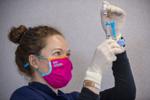David Owens thought he might get COVID-19.
Although he masked himself for work and his wife was a “disinfectant fanatic”, with two school-age children it was difficult to prevent all exposure. One test in January was positive.
But what Owens, 53, didn’t expect to result from his battle with the coronavirus was a diagnosis of type 2 diabetes.
He received the news while visiting the emergency room for a blood clot, another COVID complication. When he arrived, the nurses checked his blood sugar, which was three times normal.
“They were surprised I was conscious,” said Owens.
Over the past year, researchers have identified a cascade of problems that COVID can cause, including neurological problems, kidney and heart damage, and blood clots. More recently, signs have emerged in patients like Owens that diabetes could also be linked to coronavirus infections.

A study suggesting a recent increase in type 2 diabetes in Baton Rouge children shows another warning sign related to the coronavirus disease.
In Louisiana, where approximately 1.27 million people have prediabetes and another 124,000 have undiagnosed diabetes, doctors are seeing the increase.
“I’ve made more new diagnoses of diabetes this year than I’ve probably ever had,” said Dr. Josh Denson, a New Orleans intensive care unit pulmonologist, who estimated he diagnosed up to ten times more patients with diabetes than usual, even though he specializes in pulmonary care, not metabolic disorders.
Denson began looking for the chronic disease in COVID patients after noticing a link. But he says it’s a “chicken-or-egg” situation – it’s unclear whether patients were already on their way to diabetes or whether the coronavirus made it worse.
“We had a 32-year-old healthy man who recently had severe COVID and died,” said Denson. “He had no medical problems at all. However, if you start looking … he actually had very mild diabetes.”
Doctors knew that coronavirus infections had a harder time with diabetes patients. But it wasn’t clear until recently that the connection could be a one-way street. In November, a study found that 14.4% of hospitalized COVID patients developed some type of diabetes, according to the journal Diabetes, Obesity and Metabolism. Experts cannot yet say whether COVID triggers the chronic illness, is the decisive factor or simply reveals an unknown, already existing condition.
BOGALUSA – Whenever Wendy Perrette saw the big white trailer outside her elementary school, she knew it was going to be a good day.
Diabetes refers to a range of metabolic disorders related to how the body handles blood sugar. In people with type 1 diabetes, the pancreas – an organ that aids digestion and balances blood sugar – loses the ability to make enough insulin to regulate blood sugar. Type 2 diabetes occurs when the body builds insulin resistance and the pancreas cannot produce enough to lower blood sugar levels.
Type 1 diabetes has long been associated with viruses and is believed to be triggered when the immune system attacks the cells that make insulin. The link between viruses and type 2 diabetes isn’t that clear, but there is evidence that viruses can completely disrupt the body’s ability to regulate blood sugar levels.
During the 2003 SARS pandemic, 20 of 39 patients in a study developed diabetes within days of hospitalization, although only two three years later had diabetes. In another study of the 2003 outbreak, 7 out of 22 patients with no prior diabetes in the hospital developed high blood sugar, although researchers couldn’t tell if this was due to the treatments or the virus itself.
Owens had no history of diabetes, although his medical records showed a slightly elevated fasting blood sugar level from a few years earlier. He had never been hospitalized before COVID.

David Owens poses outside his job in Hammond, La., Friday June 25, 2021. Owens was diagnosed with Type 2 diabetes after contracting COVID in January 2021. (Photo by Sophia Germer, NOLA.com, The Times-Picayune | The New Orleans Attorney)
Once a week we will inform you about the progress of the COVID-19 vaccinations. Register today.
The question of whether COVID triggers diabetes and how a COVID-related new diabetes could develop differently is discussed among endocrinologists. Some, like Dr. Franck Mauvais-Jarvis, an endocrinologist and professor at Tulane Medical School, suggest that something in the way the virus infiltrates pancreatic cells is deleterious.
“It’s like the pancreas has had a heart attack,” said Mauvais-Jarvis, who found that autopsied pancreases from COVID patients are full of micro-clots and inflammation.
In a small sample of primates from the Tulane Primate Center, two out of six monkeys who were not pre-diabetic also developed type 2 diabetes after contracting COVID, Mauvais-Jarvis said.
A number of other factors could also explain a diagnosis after COVID. A serious illness of any kind can turn someone who may have been prediabetic into full-blown type 2 diabetes. It could be that COVID patients may already have diabetes, but it took a fight with COVID to uncover. Dexamethasone, a steroid commonly used to treat COVID, is like gasoline in a fire for blood sugar in diabetic patients, doctors said.
“It is possible that all of these stories are just the effects of infection plus some steroids,” said Mauvais-Jarvis. “But it is also possible that the virus has a toxic effect on the pancreas.”
The virus could disrupt insulin production by damaging the cells that produce insulin, a hormone that keeps blood sugar in check, said Taniya de Silva, director of the department of endocrinology at LSU Health New Orleans School of Medicine.
The inflammation that COVID creates by heating up the immune system could damage these pancreatic cells or other systems or body organs, all of which affect the regulation of sugar in the body.
“With the data still in place, we don’t really know, but there are some mechanistic possibilities for new diabetes,” said de Silva. “Since we are already at risk in our population, we should be concerned about it.”
Dareen Berniard was one of those high risk patients. She has a family history of diabetes, but she paid extra attention to her diet and had her blood sugar checked regularly. When she contracted COVID in July 2020, she thought more of breathing problems and a blood clot than diabetes. But a few months after COVID, she received a call from her doctor stating that her blood sugar levels had skyrocketed, moving her from mild prediabetes to full-blown type 2 status.
She redoubled her efforts to control her diet and worked with a nutritionist. However, another test a few weeks later showed that her blood sugar levels had risen again.
“It was a lot. It has to be stressful, ”said Berniard, a 48-year-old health insurance case manager. “I asked myself – was I really eating as healthy as I thought? Am I doing enough? “
Your doctor has now observed the sharp rise in blood sugar in two patients with previous coronavirus infections.

The employees of the Ochsner Health pharmacy will fill syringes with the COVID-19 vaccine in the Shrine on Airline in Metairie on Wednesday, February 10, 2021. Officials from Ochsner Health and Jefferson Parish opened the mass coronavirus vaccine distribution center this week. (Photo by Chris Granger | The Times-Picayune | The New Orleans Advocate)
“I really think this is being linked to COVID,” said Dr. Jason Halperin, Bernard’s doctor at CrescentCare in New Orleans. “The timing, the lack of lifestyle changes and this significant change over a period of three months is just very surprising.”
But until data is collected and examined, the connection is still a mystery. Mauvais-Jarvis begins a study at the Veterans Affairs Medical Center in New Orleans with approximately 1,500 patients. An international group of researchers has set up a global registry to track emerging diabetes and COVID.
In the meantime, patients can’t help but think that it had something to do with an outbreak of a life changing disease.
“Maybe I’ve become Type 2 across the board,” Owens said. “COVID made it the rest of the way across the finish line.”
Purchases made through links on our website can earn us an affiliate commission
